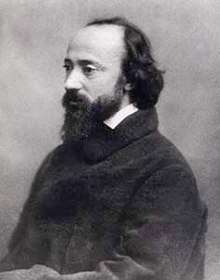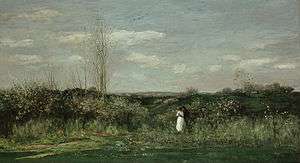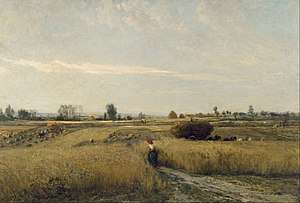Charles-François Daubigny
| Charles-François Daubigny | |
|---|---|
 Charles-François Daubigny (portrait by Nadar) | |
| Born |
15 February 1817 Paris, France |
| Died |
19 February 1878 (aged 61) Paris, France |
| Nationality | French |
| Known for | Painting |
| Movement | Barbizon school |
Charles-François Daubigny (15 February 1817 – 19 February 1878) was one of the painters of the Barbizon school, and is considered an important precursor of Impressionism.
Biography
Daubigny was born in Paris, into a family of painters and was taught the art by his father Edmond François Daubigny and his uncle, miniaturist Pierre Daubigny.
Initially Daubigny painted in a traditional style, but this changed after 1843 when he settled in Barbizon to work outside in nature. Even more important was his meeting with Camille Corot in 1852 in Optevoz (Isère). On his famous boat Botin, which he had turned into a studio, he painted along the Seine and Oise, often in the region around Auvers. From 1852 onward he came under the influence of Gustave Courbet.
In 1866 Daubigny visited England, eventually returning because of the Franco-Prussian war in 1870. In London he met Claude Monet, and together they left for the Netherlands. Back in Auvers, he met Paul Cézanne, another important Impressionist. It is assumed that these younger painters were influenced by Daubigny.
Paintings

His most ambitious canvases are Springtime (1857), in the Louvre; Borde de la Cure, Morvan (1864); Villerville sur Mer (1864); Moonlight (1865); Auvers-sur-Oise (1868); and Return of the Flock (1878). He was named by the French government as an Officer of the Legion of Honor.[1]
Daubigny died in Paris. His remains are interred at cimetière du Père-Lachaise (division 24). His followers and pupils included his son Karl (who sometimes painted so well that his works are occasionally mistaken for those of his father), Achille Oudinot, Hippolyte Camille Delpy, Albert Charpin and Pierre Emmanuel Damoye.
Public collections
Among the public collections holding works by Charles-François Daubigny are:
- Mesdag Collectie, Den Haag, Netherlands
- Museum de Fundatie, Zwolle, Netherlands
- Cincinnati Art Museum
- Rijksmuseum Amsterdam
- The Israel Museum, Jerusalem
Gallery
 Harvest, 1851
Harvest, 1851 The Ponds of Gylieu , 1853. Cincinnati Art Museum
The Ponds of Gylieu , 1853. Cincinnati Art Museum Les Sables-d'Olonne, seaside town in western France
Les Sables-d'Olonne, seaside town in western France.jpg) Boats on the Seacoast at Étaples, 1871
Boats on the Seacoast at Étaples, 1871 Farm at Kerity, Brittany
Farm at Kerity, Brittany
See also
Notes
- ↑ The Iconographic Encyclopaedia of the Arts and Scien: Sculpture and painting, 1887, page 138
References

Further reading
- O'Neill, J, ed. (2000). Romanticism & the school of nature : nineteenth-century drawings and paintings from the Karen B. Cohen collection. New York: The Metropolitan Museum of Art. (see index)
External links
| Wikimedia Commons has media related to Charles-François Daubigny. |
| Wikiquote has quotations related to: Charles-François Daubigny |
- Charles-François Daubigny - Museum - Musée Daubigny Auvers-sur-Oise
- Charles-François Daubigny's Home-Studio - Maison-Atelier de DAUBIGNY Auvers-sur-Oise. Historical monument.
- Charles-François Daubigny - Rehs Galleries' biography on the artist.
- Charles-François Daubigny at Artcyclopedia
- Banks of the Seine 1855, near Bezons, near Paris